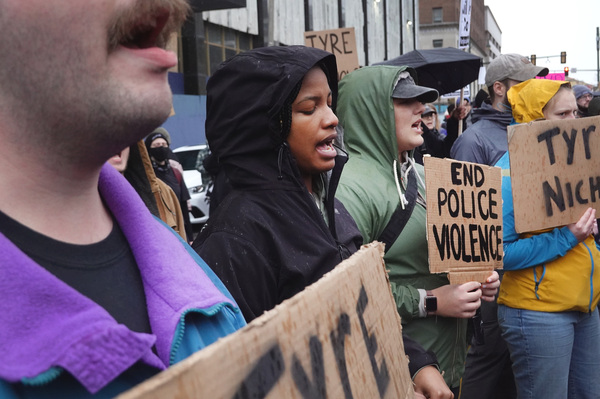Memphis deactivates the unit that fatally beat Tyre Nichols, as officials urge reform
Go Deeper.
Create an account or log in to save stories.
Like this?
Thanks for liking this story! We have added it to a list of your favorite stories.

The official efforts to respond to the vicious beating of Tyre Nichols by Memphis police are already underway, just two days after footage of the incident was released to the public.
Five Memphis police officers have been fired and charged with Nichols' murder, but lawmakers and law enforcement authorities in Tennessee say more has to be done in the wake of Nichols' death.
Meanwhile, protesters continue to take to the streets of Memphis and elsewhere around the nation to express outrage over the incident and again rally against the treatment of Black people by police.
Here's the latest:
Turn Up Your Support
MPR News helps you turn down the noise and build shared understanding. Turn up your support for this public resource and keep trusted journalism accessible to all.
Memphis police disband the so-called SCORPION Unit
The Memphis Police Department announced Saturday that it was disbanding the specialized unit whose officers stopped and beat Nichols on Jan. 7. Nichols died in the hospital three days later.
The so-called SCORPION Unit – which stood for Street Crimes Operations to Restore Peace in Our Neighborhoods – is being deactivated following a meeting between Chief Cerelyn 'C.J.' Davis and officers on the squad.
The other officers assigned to the unit "unreservedly agree with this next step," a statement from the department said.
"While the heinous actions of a few casts a cloud of dishonor on the title SCORPION," the statement went on, "it is imperative that we, the Memphis Police Department take proactive steps in the healing process for all impacted."
Davis previously said she would not disband the unit after Nichols' death, the Associated Press reported.
Ben Crump and Antonio Romanucci, two attorneys for Nichols' family, said it was "appropriate and proportional" to dissolve the police unit.
"We hope that other cities take similar action with their saturation police units in the near future to begin to create greater trust in their communities," the attorneys said. "We must keep in mind that this is just the next step on this journey for justice and accountability, as clearly this misconduct is not restricted to these specialty units. It extends so much further."
Tennessee Democrats say they'll propose police reforms this year
Top Democrats in Tennessee's state legislature say they will propose new legislation targeting police training, discipline, mental health and more in response to the death of Tyre Nichols.
House Democratic Caucus Chair John Ray Clemmons, Rep. G.A. Hardaway and Rep. Joe Towns, Jr., announced their plan during a press conference on Saturday.
Among the issues the bills aim to address are implicit bias training, mental health evaluations for police officers, limits on officers transferring departments after facing discipline or being fired and a reevaluation of low-level traffic stops, NBC News reported.
Republicans hold a sizable majority in the Tennessee General Assembly, but the Democrats said they were confident they could get bipartisan support because of the magnitude of the incident, the Memphis Commercial Appeal reported.
Crump calls for federal police reform
In media interviews over the weekend, attorney Ben Crump called on Congress to pass police reform, saying it was necessary after the death of another Black man at the hands of officers.
He specifically urged federal lawmakers to pass the George Floyd Justice in Policing Act, which was twice approved by the House but stalled in the Senate in 2021.
"Without federal police reform, I think we're going to continue to see these hashtags proliferate so much that we can't keep up with them," Crump told ABC's This Week.
The George Floyd Justice in Policing Act would ban chokeholds, prohibit no-knock warrants in federal drug cases, end qualified immunity for law enforcement officers – and more.
Copyright 2023 NPR. To see more, visit https://www.npr.org.


